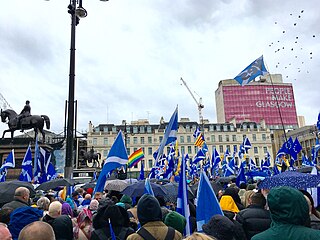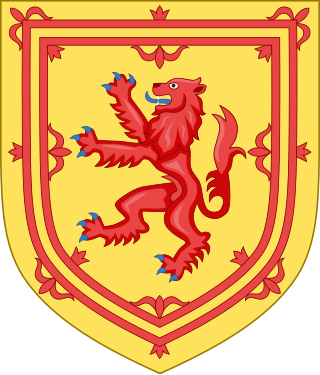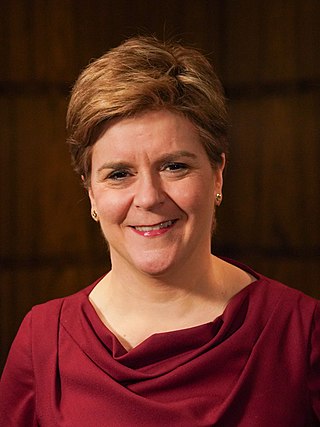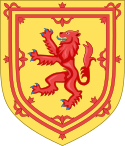
The politics of the United Kingdom functions within a constitutional monarchy where executive power is delegated by legislation and social conventions to a unitary parliamentary democracy. From this a hereditary monarch, currently Charles III, serves as head of state while the Prime Minister of the United Kingdom, currently Rishi Sunak, serves as the elected head of government.

The Bill of Rights 1689 is an Act of the Parliament of England that set out certain basic civil rights and clarified who would be next to inherit the Crown. It remains a crucial statute in English constitutional law.

Scottish independence is the idea of Scotland as a sovereign state, independent from the United Kingdom, and refers to the political movement that is campaigning to bring it about.

The politics of Scotland operate within the constitution of the United Kingdom, of which Scotland is a country. Scotland is a democracy, being represented in both the Scottish Parliament and the Parliament of the United Kingdom since the Scotland Act 1998. Most executive power is exercised by the Scottish Government, led by the First Minister of Scotland, the head of government in a multi-party system. The judiciary of Scotland, dealing with Scots law, is independent of the legislature and the Scottish Government. Scots law is primarily determined by the Scottish Parliament. The Scottish Government shares some executive powers with the Government of the United Kingdom's Scotland Office, a British government department led by the Secretary of State for Scotland.

Unionism in Scotland is a political movement which favours the continuation of the political union between Scotland and the other countries of the United Kingdom, and hence is opposed to Scottish independence. Scotland is one of four countries of the United Kingdom which has its own devolved government and Scottish Parliament, as well as representation in the UK Parliament. There are many strands of political Unionism in Scotland, some of which have ties to Unionism and Loyalism in Northern Ireland. The two main political parties in the UK — the Conservatives and Labour — both support Scotland remaining part of the UK.

The 2010 United Kingdom general election was held on Thursday 6 May 2010, with 45,597,461 registered voters entitled to vote to elect members to the House of Commons. The election took place in 650 constituencies across the United Kingdom under the first-past-the-post system.

The Oath of Allegiance is a promise to be loyal to the British monarch, and his or her heirs and successors, sworn by certain public servants in the United Kingdom, and also by newly naturalised subjects in citizenship ceremonies. The current standard wording of the oath of allegiance is set out in the Promissory Oaths Act 1868.

The Liberal Democrats are a liberal political party in the United Kingdom, founded in 1988. Since the 1992 general election, with the exception of the 2015 general election, they have been the third-largest UK political party by the number of votes cast. They have 15 members of Parliament in the House of Commons, 84 members of the House of Lords, four Members of the Scottish Parliament and one member in the Welsh Senedd. The party has nearly 3,000 local council seats. The party holds a twice-per-year Liberal Democrat Conference, at which party policy is formulated. In contrast to its main opponents' conference rules, the Lib Dems grant all members attending its Conference the right to speak in debates and vote on party policy, under a one member, one vote system. The party also allows its members to vote online for its policies and in the election of a new leader. The party served as the junior party in a coalition government with the Conservative Party between 2010 and 2015; with Scottish Labour in the Scottish Executive from 1999 to 2007, and with Welsh Labour in the Welsh Government from 2000 to 2003 and from 2016 to 2021.

The constitution of the United Kingdom is the set of rules that make up the United Kingdom of Great Britain and Northern Ireland as a political body. Unlike in most countries, the constitution is not codifed, but is written into thousands of statutes and court cases, and found in unwritten political conventions and social consensus. The UK Supreme Court recognises principles, that guide the constitution, including parliamentary sovereignty, the rule of law, democracy, and upholding international law. It also recognises that some Acts of Parliament have special constitutional status. These include Magna Carta, which in 1215 required the King to call a "common counsel" to represent people, to hold courts in a fixed place, to guarantee fair trials, to guarantee free movement of people, to free the church from the state, and to guarantee rights of "common" people to use the land. After the Glorious Revolution, the Bill of Rights 1689 and the Claim of Right Act 1689 cemented Parliament's position as the supreme law-making body, and said that the "election of members of Parliament ought to be free". The Treaty of Union in 1706 and the Acts of Union 1707 Kingdoms of England, Wales and Scotland, the Acts of Union 1801 joined Ireland, but the Irish Free State separated after the Anglo-Irish Treaty in 1922, leaving Northern Ireland within the UK. After struggles for universal suffrage, the UK guaranteed every adult citizen over 21 years the equal right to vote in the Representation of the People Act 1928. After World War II, the UK became a founding member of the Council of Europe to uphold human rights, and the United Nations to guarantee international peace and security. The UK was a member of the European Union, joining its predecessor in 1973, but left in 2020. The UK is also a founding member of the International Labour Organization and the World Trade Organization to participate in regulating the global economy.

A referendum on Scottish independence from the United Kingdom was held in Scotland on 18 September 2014. The referendum question was, "Should Scotland be an independent country?", which voters answered with "Yes" or "No". The "No" side won with 2,001,926 (55.3%) voting against independence and 1,617,989 (44.7%) voting in favour. The turnout of 84.6% was the highest recorded for an election or referendum in the United Kingdom since the January 1910 general election, which was held before the introduction of universal suffrage.

The 2021 Scottish Parliament election took place on 6 May 2021, under the provisions of the Scotland Act 1998. All 129 Members of the Scottish Parliament were elected in the sixth election since the parliament was re-established in 1999. The election was held alongside the Senedd election, English local elections, London Assembly and mayoral election and the Hartlepool by-election.

The European Union Act 2011, was an Act of the Parliament of the United Kingdom, requiring a referendum be held on amendments of the Treaty on European Union or the Treaty on the Functioning of the European Union. Introduced in the House of Commons by Her Majesty's Principal Foreign Secretary, William Hague on 11 November 2010, the Bill received its Second Reading by 330-195 on 7 December, and was passed by the Commons on 8 March 2011. The Bill was read a second time in the Lords on 22 March, after a hostile reception by Peers. The Act received Royal Assent on 19 July 2011.

In the United Kingdom, devolution is the Parliament of the United Kingdom's statutory granting of a greater level of self-government to the Scottish Parliament, the Senedd, the Northern Ireland Assembly and the London Assembly and to their associated executive bodies the Scottish Government, the Welsh Government, the Northern Ireland Executive and in England, the Greater London Authority and combined authorities.

Parliamentary sovereignty is an ancient concept central to the functioning of the constitution of the United Kingdom but which is also not fully defined and has long been debated. Since the subordination of the monarchy under parliament, and the increasingly democratic methods of parliamentary government, there have been the questions of whether parliament holds a supreme ability to legislate and whether or not it should.
Parliamentary sovereignty, also called parliamentary supremacy or legislative supremacy, is a concept in the constitutional law of some parliamentary democracies. It holds that the legislative body has absolute sovereignty and is supreme over all other government institutions, including executive or judicial bodies. It also holds that the legislative body may change or repeal any previous legislation and so it is not bound by written law or by precedent.

The 2015 United Kingdom general election was held on Thursday 7 May 2015 to elect 650 Members of Parliament to the House of Commons. It was the only general election held under the rules of the Fixed-term Parliaments Act 2011 and was the last general election to be held before the United Kingdom would vote to end its membership to the European Union (EU). Local elections took place in most areas of England on the same day.
Events from the year 2015 in Scotland.

The 2017 United Kingdom general election was held on Thursday 8 June 2017, two years after the previous general election in 2015; it was the first since 1992 to be held on a day that did not coincide with any local elections. The governing Conservative Party remained the largest single party in the House of Commons but lost its small overall majority, resulting in the formation of a Conservative minority government with a confidence and supply agreement with the Democratic Unionist Party (DUP) of Northern Ireland.

The 2019 United Kingdom general election was held on Thursday 12 December 2019 to elect members of the House of Commons. The Conservative Party won a landslide victory with a majority of 80 seats, a net gain of 48, on 43.6% of the popular vote, the highest percentage for any party since the 1979 United Kingdom general election.

A second referendum on independence from the United Kingdom (UK) has been proposed by the Scottish Government. An independence referendum was first held on 18 September 2014, with 55% voting "No" to independence. The Scottish Government stated in its white paper for independence that voting Yes was a "once in a generation opportunity to follow a different path, and choose a new and better direction for our nation". Following the "No" vote, the cross party Smith Commission proposed areas that could be devolved to the Scottish Parliament; this led to the passing of the Scotland Act 2016, formalising new devolved policy areas in time for the 2016 Scottish Parliament election campaign.














